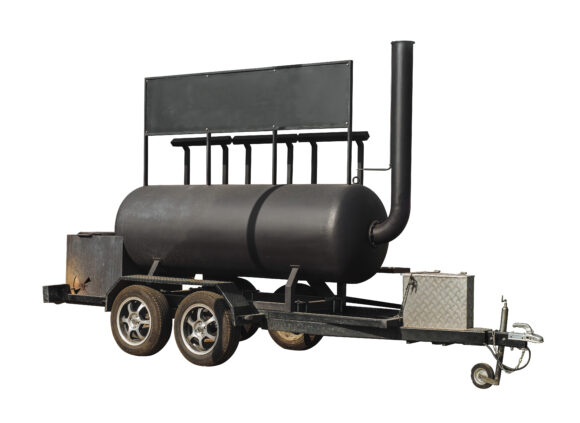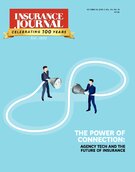For many people, the outdoor grilling season is about over. Notice that I said “grilling” season and not “BBQing” season. Being a Southerner, we know that outdoor cooking is known as “grilling,” not “BBQing.” BBQing involves smoking meat and slathering it with BBQ sauce. The proper term is “grilling” — at least in these parts.
But while the summer grilling season has passed, the coverage issues continue. The subject of this month’s column is a claim involving a BBQ restaurant’s mobile smoker/grill. The smoker was permanently mounted on a trailer, which was disconnected from the insured towing vehicle and set up at a July BBQ cookoff. A child was severely burned by the grill. The question was whether this claim/suit would be covered by the restaurant’s ISO Business Auto Policy (BAP) or Commercial General Liability (CGL) policy. So, which is it? Does it depend on whether the smoker/trailer is an “auto” or “mobile equipment”? Let’s consider each policy.
The BAP
While the trailer/smoker is being towed, the BAP covers it and it doesn’t matter whether it’s an “auto” or “mobile equipment.” The ISO BAP in force said, “If Liability Coverage is provided by this coverage form, the following types of vehicles are also covered ‘autos’ for Liability Coverage … 1. ‘Trailers’ with a load capacity of 2,000 pounds or less designed primarily for travel on public roads… [and] 2. ‘Mobile equipment’ while being carried or towed by a covered ‘auto’.”
But in the subject claim, the trailer/smoker was at a fixed location when the occurrence took place. So, is this smoker/trailer an “auto”? The “auto” definition in the BAP includes a trailer designed for travel on public roads. Kind of sounds like the contraption is an “auto.” But, the definition goes on to say that “‘auto’ does not include ‘mobile equipment’.” So, could this actually be “mobile equipment”?
The “mobile equipment” definition in the BAP includes vehicles “maintained primarily for purposes other than the transportation of persons or cargo.” The trailer/smoker isn’t used to transport persons or cargo, so now it sounds like it’s “mobile equipment” and not an “auto.”
Well, the BAP goes on to say in the “mobile equipment” definition:
However, “mobile equipment” does not include land vehicles that are subject to a compulsory or financial responsibility law or other motor vehicle insurance law where it is licensed or principally garaged. Land vehicles subject to a compulsory or financial responsibility law or other motor vehicle insurance law are considered “autos.”
Even if it’s otherwise “mobile equipment,” if it’s subject to motor vehicle insurance laws, it’s really not a “mobile equipment,” but rather an “auto.” So, it sounds like the injury is covered under the BAP policy? Not so fast.
We now move to Exclusion 9 in the BAP for “Operations” which excludes BI or PD arising out of “the operation of … Machinery or equipment that is on, attached to, or part of, a land vehicle that would qualify under the definition of ‘mobile equipment’ if it were not subject to a compulsory or financial responsibility law or other motor vehicle insurance law where it is licensed or principally garaged.”
The trailer/smoker would qualify as “mobile equipment” if it were not subject to motor vehicle insurance laws. And, even if it is subject to motor vehicle laws, this exclusion says that the BAP does not cover operation of the equipment. So, it doesn’t matter whether the trailer/smoker is subject to motor vehicles laws or not. If it’s not, then it’s “mobile equipment” and not covered by the BAP. If it is, then it’s subject to Exclusion 9 and not covered by the BAP.
The CGL
The definitions of “auto” and “mobile equipment” are almost identical in the ISO BAP and CGL policy except that the CGL definition of “auto” ends with “… including any attached machinery or equipment” (this distinction is important when we examine the issue of coverage for the operation of equipment below).
And, if the trailer/smoker is “mobile equipment,” the only exclusion in the CGL policy is for its transportation by “autos” owned or operated by or rented or loaned to an insured, or its involvement in racing, demolition or stunting activities. So, if the trailer/smoker is “mobile equipment,” it’s covered by the CGL policy.
If the trailer/smoker is an “auto,” the CGL policy has an exclusion for certain aircraft, autos or watercraft:
“Bodily injury” or “property damage” arising out of the ownership, maintenance, use or entrustment to others of any aircraft, “auto” or watercraft owned or operated by or rented or loaned to any insured. Use includes operation and “loading or unloading”.
Uh oh, it looks like this excludes the use of the trailer/smoker if it’s an “auto.” However, if we continue reading the exclusion, it says that the exclusion does not apply to BI or PD arising out of:
The operation of machinery or equipment that is attached to, or part of, a land vehicle that would qualify under the definition of “mobile equipment” if it were not subject to a compulsory or financial responsibility law or other motor vehicle insurance law where it is licensed or principally garaged.
So, what happened? The child was injured because of the operation of equipment (the smoker/grill) that was attached to or part of the land vehicle (the trailer). So, even if the trailer/smoker is an “auto” because it’s subject to a motor vehicle law, this exception says that if it would otherwise be “mobile equipment” if it wasn’t subject to such a law, then the exclusion doesn’t apply. In other words, the CGL policy provides coverage for the operation of the smoker/grill whether it’s “mobile equipment” or an “auto.”
An issue that often comes up in E&O classes is whether an insured has an obligation to read the policy. Case law varies, with some courts opining that, even if an insured read the policy, they wouldn’t understand what is and isn’t covered. In some cases, that’s probably true. This claim is a good example of where 99.99% of insureds who read the policies involved would still have no clue as to whether there was coverage under which policy.
Admittedly, even my head is spinning — so the next time a customer asks a coverage question, hesitate before suggesting that they simply read the policy.
Was this article valuable?
Here are more articles you may enjoy.



 Maine Plane Crash Victims Worked for Luxury Travel Startup Led by Texas Lawyer
Maine Plane Crash Victims Worked for Luxury Travel Startup Led by Texas Lawyer  Florida Senate President Says No Major Insurance Changes This Year
Florida Senate President Says No Major Insurance Changes This Year  The $3 Trillion AI Data Center Build-Out Becomes All-Consuming for Debt Markets
The $3 Trillion AI Data Center Build-Out Becomes All-Consuming for Debt Markets  Zurich Insurance’s Beazley Bid Sets the Stage for More Insurance Deals
Zurich Insurance’s Beazley Bid Sets the Stage for More Insurance Deals 



